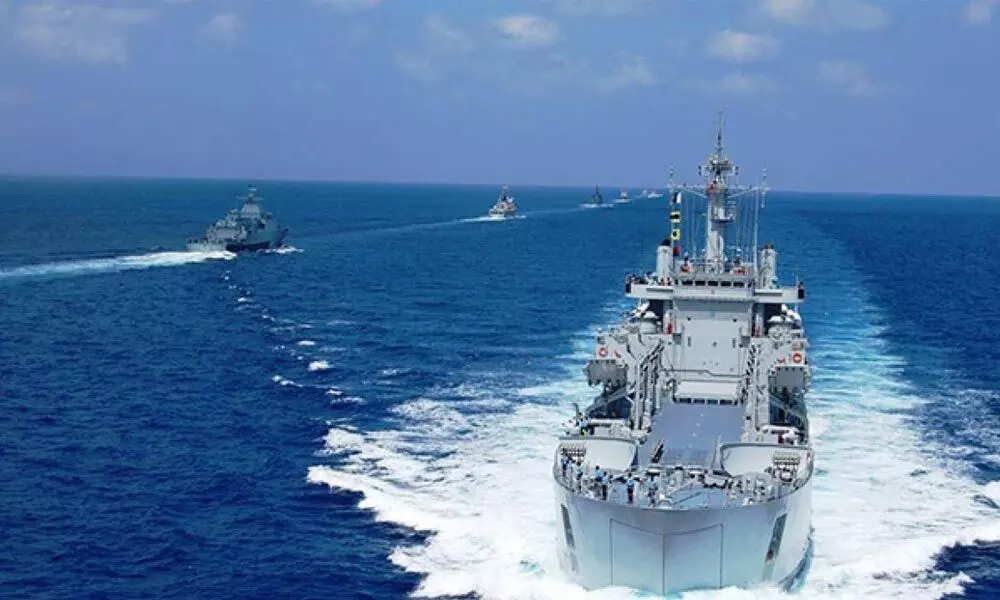How India shifts focus to maritime dimensions
ndia's foreign policy outlook, which previously had a continental focus, has now come of age with a distinct maritime flavour
image for illustrative purpose

"... those once bitten by a snake fear even a twisted rope," William Dalrymple, Return of a King: The Battle for Afghanistan 1839-42.
India's foreign policy outlook, which previously had a continental focus, has now come of age with a distinct maritime flavour. Apropos, Prime Minister Narendra Modi chaired a high-level UNSC debate on Enhancing Maritime Security - A Case for International Cooperation on August 9. India's maritime diplomacy has considerably enhanced under the SAGAR initiative (Security And Growth for All in the Region), bestowing upon us the moniker of Preferred Security Partner in the IOR (Indian Ocean Region).
Recent events in Afghanistan have laid bare the inadequacies of modern military tactics against a determined and well-funded guerrilla outfit. William Darlrymple's prophetic words above would also suggest that the US is likely to tread carefully in Afghanistan in coming years. While the fallout of Afghanistan's dramatic collapse will be felt in coming weeks and months, India must remain nimble and fleet-footed to the developing situation in the maritime domain.
Alibi for Pakistan-sponsored maritime terror
Afghanistan presents Pakistan and the mendacious ISI with an alibi for engaging in maritime-based terror activities. With the resurgence of Taliban, IS-K, Al-Qaeda and Haqqani Network, Pakistan may ramp up terror-related activities to harm India, including in the maritime domain. The current disaffection of the western world with Afghan terror groups and shift of their focus away from Pakistan may embolden ISI to strike India. Indian maritime security agencies, headed by the Indian Navy, would need to remain aware and cognisant of this emerging threat.
J&K flare up
Having wrested Afghanistan from the worlds lone super-power has been a proverbial shot-in-the-arm for the worlds terror-factories. The New York Times recently quoted Ali Mohamed Ali, a former Afghan security official Afghanistan has now become the Las Vegas of terrorists, radicals and extremists who are chanting and celebrating the Taliban victory.
Pakistan's waning Kashmir narrative has made the Imran Khan government and the ISI desperate for an opening. They are not likely to miss this opportunity to channel hardened fighters across their Eastern border to hamper progress being made in the Union Territory of Jammu and Kashmir. Indian security forces must remain alert to such misadventures and be prepared for retaliatory actions.
PLA navy
2020 was watershed year in many regards, particularly due to emergence of the Covid-19 virus in Wuhan and belligerence of the Chinese Communist Party (CCP) and its military. Medieval tactics by the People's Liberation Army (PLA) in Ladakh was matched by shrill provocations by CCPs state-run media. The Indian military deployments and manoeuvres in subsequent months clearly demonstrated to the CCP, India's dominating position astride the Indian Ocean. This is likely to have had significant impact on the CCPs calculus, since the PLA (N) would have been at considerable disadvantage in the IOR in case of an escalation. The PLA Navy already deploys an Anti-Piracy Escort Force in the Red Sea. PLA (N) planners are unlikely to miss an opportunity to augment their presence in the IOR and will be watching events in Afghanistan with a hawk-eye. Any emergent window of opportunity in the maritime domain must, therefore, be tracked and acted upon. However, Navies cost money and ships are designed, planned and built over decades. While the current government has shown resolve to bolster Indian Navy's assets, there is an urgent need to review inter-service allocation of precious capital resources.

